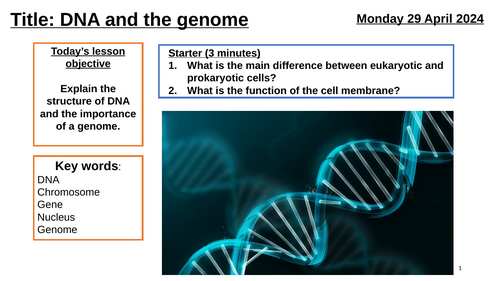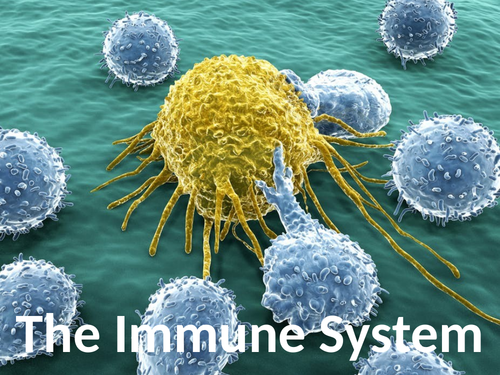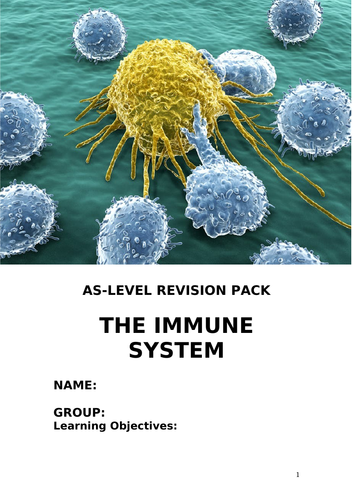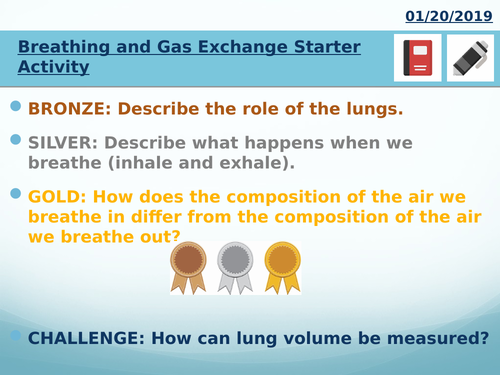79Uploads
21k+Views
15k+Downloads
All resources

AQA GCSE Biology "Lesson 12 - Variation" (Inheritance, Variation & Evolution Topic)
AQA GCSE Biology “Lesson 12 - Variation” (Inheritance, Variation & Evolution Topic)
A full lesson (with answers) all about Variation.
The lesson contains…
Starter activity
Application tasks
Quick Check Questions
Plenary activity
Please check out my other resources for this topic :)

AQA GCSE Biology "Lesson 8 - Genetic Inheritance" (Inheritance, Variation & Evolution Topic)
AQA GCSE Biology “Lesson 8 - Genetic Inheritance” (Inheritance, Variation and Evolution Topic)
A full lesson (with answers) all about Genetic Inheritance.
The lesson contains…
Starter activity
Application tasks
Quick Check Questions
Plenary activity
Exam Questions
Please check out my other resources for this topic :)

AQA GCSE Biology "Lesson 7 - Meiosis" (Inheritance, Variation & Evolution Topic)
AQA GCSE Biology “Lesson 7 - Meiosis” (Inheritance, Variation and Evolution Topic)
A full lesson (with answers) all about Meiosis.
The lesson contains…
Starter activity
Application tasks
Quick Check Questions
Plenary activity
Please check out my other resources for this topic :)

AQA GCSE Biology "Lesson 5 - Sexual Asexual Reproduction (Inheritance, Variation & Evolution Topic)
AQA GCSE Biology "Lesson 5 - Sexual and Asexual Reproduction (Inheritance, Variation and Evolution Topic)
A full lesson (with answers) all about sexual and asexual reproduction.
The lesson contains…
Starter activity
Application tasks
Quick Check Questions
Plenary activity
Please check out my other resources for this topic :)

AQA GCSE Biology Lesson 6- Asexual Sexual Reproduction BIO ONLY (Inheritance Variation & Evolution)
AQA GCSE Biology Lesson 6 - Asexual vs. Sexual Reproduction BIO ONLY (Inheritance, Variation & Evolution Topic)
A full lesson with worksheets (and answers) all about Asexual vs. Sexual Reproduction.
The lesson contains…
Starter activity
Application questions
Exam questions
Plenary activity
Please note that this lesson is for Triple Biology students only.
Please check out my other resources for this topic :)

AQA GCSE Biology "Lesson 3-Protein Synthesis" BIO HT ONLY (Inheritance, Variation & Evolution Topic)
AQA GCSE Biology “Lesson 3-Protein Synthesis” BIO HT ONLY (Inheritance, Variation & Evolution Topic)
A full lesson with worksheets (and answers) all about the protein synthesis.
The lesson contains…
Starter activity
Application tasks
Quick check questions
Plenary activity
Please note that this lesson is for Triple Higher Tier Biology students only.
Please check out my other resources for this topic :)

AQA GCSE Biology "Lesson 4 - DNA Mutations" BIO HT ONLY (Inheritance, Variation & Evolution Topic)
AQA GCSE Biology “Lesson 4 - DNA Mutations” BIO HT ONLY (Inheritance, Variation & Evolution Topic)
A full lesson with worksheets (and answers) all about DNA mutations.
The lesson contains…
Starter activity
Application tasks
Exam questions
Plenary activity
Please note that this lesson is for Triple Higher Tier Biology students only.
Please check out my other resources for this topic :)

AQA GCSE Biology "Lesson 1 - DNA and The Genome" (Inheritance, Variation and Evolution Topic)
AQA GCSE Biology “Lesson 1 - DNA and The Genome” (Inheritance, Variation and Evolution Topic)
A full lesson with worksheets (and answers) all about DNA and the Genome.
The lesson contains…
Starter activity
Application tasks
Exam questions
Plenary activity
Please check out my other resources for this topic :)

AQA GCSE Biology "Lesson 2 - Structure of DNA" BIO ONLY (Inheritance, Variation and Evolution Topic)
AQA GCSE Biology “Lesson 2 - Structure of DNA” BIO ONLY (Inheritance, Variation and Evolution Topic)
A full lesson with worksheets (and answers) all about the structure of DNA.
The lesson contains…
Starter activity
Application tasks
Exam questions
Plenary activity
Please note that this lesson is for Triple Biology students only.
Please check out my other resources for this topic :)

AS/A2 Level Year 12/13 Immune System Immunity Full Lesson Presentation
Presentation covering the following information…
LO1) Describe the physical and chemical (non-specific) defences against pathogens in animals, including the skin, blood clotting, wound repair, inflammation, expulsive reflexes and mucous membranes.
LO2) Describe the structure and mode of action of phagocytes in the non-specific (innate) immune response, including neutrophils and antigen-presenting cells and the roles of cytokines, opsonins, phagosomes and lysosomes.
LO3) Describe the structure, different roles and modes of action of T lymphocytes in the specific (adaptive) immune response, including clonal selection and clonal expansion, T helper cells, T killer cells, T regulatory cells and memory cells.
LO4) Describe the structure, different roles and modes of action of B lymphocytes in the specific (adaptive) immune response, including plasma cells and memory cells.
LO5) Explain the significance of cell signaling, with reference to interleukins.
To accompany my “AS Immune System” Student Revision Booklet Pack (see other resources).

GCSE AQA Science Year 10 End of Year Revision Quiz Lesson - Biology, Chemistry and Physics
GCSE AQA Science Year 10 End of Year Revision Quiz Lesson
End of year quiz consisting of 9 rounds of questions on Year 10 science topics (Biology, Chemistry and Physics).
90 questions in total, including answers.

AS/A2 Level Year 12/13 Immune System Immunity Revision Booklet Pack
Revision pack for students to fill out (including exam tips and practice questions), covering the following topics on the immune system…
LO1) Describe the physical and chemical (non-specific) defences against pathogens in animals, including the skin, blood clotting, wound repair, inflammation, expulsive reflexes and mucous membranes.
LO2) Describe the structure and mode of action of phagocytes in the non-specific (innate) immune response, including neutrophils and antigen-presenting cells and the roles of cytokines, opsonins, phagosomes and lysosomes.
LO3) Describe the structure, different roles and modes of action of T lymphocytes in the specific (adaptive) immune response, including clonal selection and clonal expansion, T helper cells, T killer cells, T regulatory cells and memory cells.
LO4) Describe the structure, different roles and modes of action of B lymphocytes in the specific (adaptive) immune response, including plasma cells and memory cells.
LO5) Explain the significance of cell signaling, with reference to interleukins.
LO6) Examine and draw cells observed in blood smears.
LO7) Describe the structure and functions of antibodies.
LO8) Describe the actions of agglutinins and anti-toxins.
LO9) Describe the difference between primary and secondary immune responses, including the roles of T memory and B memory cells.
LO10) Describe the differences between active and passive immunity, and between natural and artificial immunity, and state examples of each.
LO11) Describe what autoimmunity is, and give examples.
LO12) Explain the main principles of vaccination and the role of vaccination programmes in the prevention of epidemics.

iGCSE Science: Reliability, Accuracy, and Validity Lesson Pack - Evaluating Experimental Data
iGCSE Science: Reliability, Accuracy, and Validity Lesson Pack- Evaluating Experimental Data
Lesson pack designed to help students understand the difference between reliability, accuracy and validity when evaluating experimental data.
Created for iGCSE, but can be easily adapted to suit other exam boards.
Lesson consists of…
Differentiated learning objectives.
RAG starter questions with extension activity, key word handouts, and answers.
Accurate vs. reliable dartboard activity with worksheets.
BIG PHARMA Bingo activity, with bingo statements and 15 bingo cards.
“Would I lie to you?” plenary.
Works really well for Year 9, 10 or 11.

KS3/KS4 Chemistry Science Balancing Equations Bronze/Silver/Gold Worksheets (& Presentation)
Bronze (low ability), silver (medium ability), and gold (high ability) graded worksheets on balancing chemical equations. Students can start on bronze-level and work their way up to gold. Helps you to easily differentiate within the classroom. Useful for KS3, KS4, and all sciences.
Also contains a PowerPoint presentation with 3 examples to run through first! :)

KS3/KS4 Biology Gas Exchange System Lungs Breathing Respiration Full Lesson
Whole lesson PowerPoint containing…
BRONZE/SILVER/GOLD differentiated starter questions
Learning objectives
Numeracy activity labeling the structure of the gas exchange system
How we inhale/exhale
Links to aerobic respiration
How the lungs are adapted to gas exchange
Composition of the air we inhale and exhale
How lung volume is measured
QUICK CHECK true or false questions
What have I learnt today plenary.

KS3 Year 8 Biology Science Aerobic Respiration Full Lesson
Full Year 8 science (biology) lesson on aerobic respiration, containing…
Starter activity: bronze, silver and gold level (plus extra challenge).
What is aerobic respiration?
How are the reactants/products of respiration transported around the body?
Quick check: TRUE or FALSE questions.
Why do we need energy?
Comparison of aerobic respiration to breathing, combustion, and anaerobic respiration.
Quick check: Word Match activity.

AS/A Level Year 12/13 Biology Biological Molecules Carbohydrate Revision Cards
PowerPoint Presentation containing printable “fill the gap” revision cards (plus answers) for AS/A Level Year 12/13 (OCR) Biology (Biological Molecules) Carbohydrate Lessons.
Cards include:
Monosaccharides - alpha-glucose, beta-glucose, and ribose.
Disaccharides - maltose, sucrose, and lactose.
Polysaccharides - amylose/amylopectin (starch), glycogen, and cellulose (how their structure is related to their function).
Glycosidic bonds, condensation reactions, and hydrolysis reactions.
All cards are colour-coded, numbered, and link to each other.

KS3/KS4 Year 8 Science Chemistry Diffusion Particles Full Lesson
Full lesson with differentiated starter activity and quick check true or false questions.

KS3/KS4 Year 8 Science Chemistry Chemical reactions and physical changes Full lesson
Full lesson with differentiated starter activity, learning objectives, and quick check true or false questions.

KS3/KS4 Year 8 Chemistry Science Pressure Particles Full Lesson
Full lesson with learning objectives and quick check true or false questions.




















